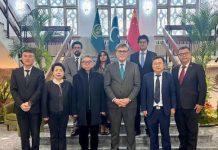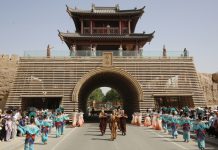From Our
Correspondent
BEIJING: A draft decision on establishing and improving the legal system and enforcement mechanisms for the Hong Kong Special Administrative Region (HKSAR) to safeguard national security was submitted to China’s national legislature for deliberation on Friday.
Wang Chen, vice chairman of the Standing Committee of the National People’s Congress (NPC) explained the draft decision to the third session of the 13th NPC, which runs from May 22 to 28.
Since the return of Hong Kong to the motherland, China has been firmly implementing the principles of “one country, two systems,” “the people of Hong Kong governing Hong Kong,” and a high degree of autonomy, Wang said.
The practice of “one country, two systems” has achieved unprecedented success in Hong Kong, he said.
But the increasingly notable national security risks in the HKSAR have become a prominent problem, the vice chairman said, citing activities that have seriously challenged the bottom line of the “one country, two systems” principle, harmed the rule of law, and threatened national sovereignty, security and development interests.
Law-based and forceful measures must be taken to prevent, stop and punish such activities, he noted.
Article 23 of the Basic Law of the HKSAR stipulates that the HKSAR shall enact laws on its own to prohibit any act of treason, secession, sedition, subversion against the Central People’s Government, or theft of state secrets, to prohibit foreign political organizations or bodies from conducting political activities in the HKSAR, and to prohibit political organizations or bodies of the HKSAR from establishing ties with foreign political organizations or bodies.
More than 20 years after Hong Kong’s return, however, relevant laws are yet to materialize due to the sabotage and obstruction by those trying to sow trouble in Hong Kong and China at large, as well as external hostile forces, Wang said. Considering Hong Kong’s situation at present, efforts must be made at the state-level to establish and improve the legal system and enforcement mechanisms for the HKSAR to safeguard national security, to change the long-term “defenseless” status in the field of national security, Wang said. This will advance the institutional building to safeguard national security on the course of China’s Constitution and the Basic Law of the HKSAR, he said.
This will also strengthen the work of safeguarding national security and ensure the steady and enduring growth of the cause of “one country, two systems”, he added.
Wang elaborated on the basic principles include; “Firmly safeguarding national security; Upholding and improving the “one country, two systems”; Adhering to governing Hong Kong in accordance with the law; Resolutely opposing external interference; Substantially safeguarding the legitimate rights and interests of Hong Kong residents”.
The draft decision consists of an introduction and seven articles, according to Wang.
Article 1 states clearly that the country will unswervingly, fully and faithfully implement the principles of “one country, two systems,” “the people of Hong Kong governing Hong Kong,” and a high degree of autonomy; stresses taking necessary measures to establish and improve the legal system and enforcement mechanisms for the HKSAR to safeguard national security, as well as prevent, stop and punish activities endangering national security in accordance with the law;
Article 2 states clearly that the country resolutely opposes the interference in the HKSAR affairs by any foreign or external forces in any form and will take necessary countermeasures.






